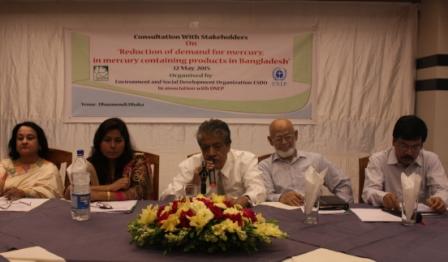Govt. is urged to take necessary steps to ban mercury use in consumer products

Concerned stakeholders emphasized on taking necessary steps to ban mercury use in a number of consumer products in a stakeholder consultation yesterday.
Environment and Social Development Organization- ESDO in association with United Nation Environment Program (UNEP) arranged the consultation, “Reduction of demand for Mercury, in mercury containing products in Bangladesh.” The discussants expressed their grave concerns over the extent of mercury hazards in Bangladesh and underlined the urgent need for ratifying the Minamata Convention through making policies and enforcing laws.
The consultation was chaired by Syed Marghub Murshed, Former Secretary, Government of Bangladesh and Chairperson of ESDO. He called for everyone’s help in building mercury and chemical free, hence, a safe and healthy environment. Dr. Abu Jafar Mahmood, a mercury researcher and a former faculty of the University of Dhaka said, “Mercury exposure is growing at an alarming rate which is risking environment and public health in Bangladesh. This is one of the responsible agents for causing kidney failure, damaging brain, and reducing the immune system’s efficiency in human body. He asked professionals from government and non-government organizations, institutions, and common people to be well aware of the toxicity, risks, and any other associated facts of mercury. He also asked them to be fully supportive to ESDO’s effort regarding mercury for the sake a safer environment.
ESDO has conducted an extensive research project and also has raised mass awareness on mercury’ toxicity. A baseline survey has already been done on several sectors. Striking information has been revealed by interviewing around 50 industrialists and more than 200 manufacturers and retailers. According to a report, mercury has been detected in many consumer products such as electronic gadgets, fluorescent bulbs, switches, batteries, thermometer, dental amalgam, jewelries, and beauty products. The imported mercury equivalent to $ USD 16,000 is one of the sources of this mercury in Bangladesh, according to the UN Comtrade Statistics, 2006. Not only this, the mercury waste discharged from factories pollutes air and water, eventually finds its way to human body.
The main objectives of the project are to create public awareness, as well as strengthening capacities to replace mercury-added products and ensure an environmentally sound management of end-of-life mercury-added products in Bangladesh and presenting the primary results of the research conducted by ESDO.
Concerned stakeholders and representatives including experts, specialists, and officials from Department of Environment (DoE), Bangladesh Standard Testing Institute (BSTI), Bangladesh Council of Scientific and Industrial Research (BCSIR), Dhaka University, Jahangir Nagar University, Jagannath University, Bangladesh University of Engineering and Technology (BUET), State University, Bangladesh Dental Society (BDS), health sectors and associations participated in the consultation urged for immediate banning of mercury and mercury containing products.
Dr. Shahriar Hossain, mercury specialist of UNEP and Secretary General of ESDO, said, “Minamata Convention on Mercury held by UNEP in 2014 had 140 signatory countries including Bangladesh. According to this, these countries would ban mercury by 2020. This treaty was signed in Geneva, the capital city of Switzerland. It was named after the city Minamata, the victim of mercury contamination in Japan. The signatory countries will have to lessen mercury emission from thermometer, fluorescent bulbs, electric power plant, and cement industries. All countries agreed to control emission of mercury, a chemical hazardous for health, trough signing the treaty. According to the treaty, production of mercury containing products, their import and export will have to be banned within 2020. We aim to implement this treaty.”
Siddika Sultana, Executive Director of ESDO welcomed the support of the organizations such as ministries and departments of the Government of Bangladesh like DoE, BSTI, and BCSIR, academicians and associations were present. She said that we need to conduct such stakeholder consultation more which aimed at discussing on law enforcement on mercury hazards, selling, use, and import.
The participants articulated their concerns on the wide-spread use of mercury in Bangladesh and welcomed such initiatives of ESDO. They urged the government to take proper steps to ban mercury consumer goods and requested everyone to go for the alternative to mercury. They offered full support in ESDO’s attempt in banning mercury globally.
Since its birth, Environment and Social Development Organization- ESDO has been committed to working against toxics like mercury through campaigning for mercury free dentistry for a sustainable environmental and societal development.

